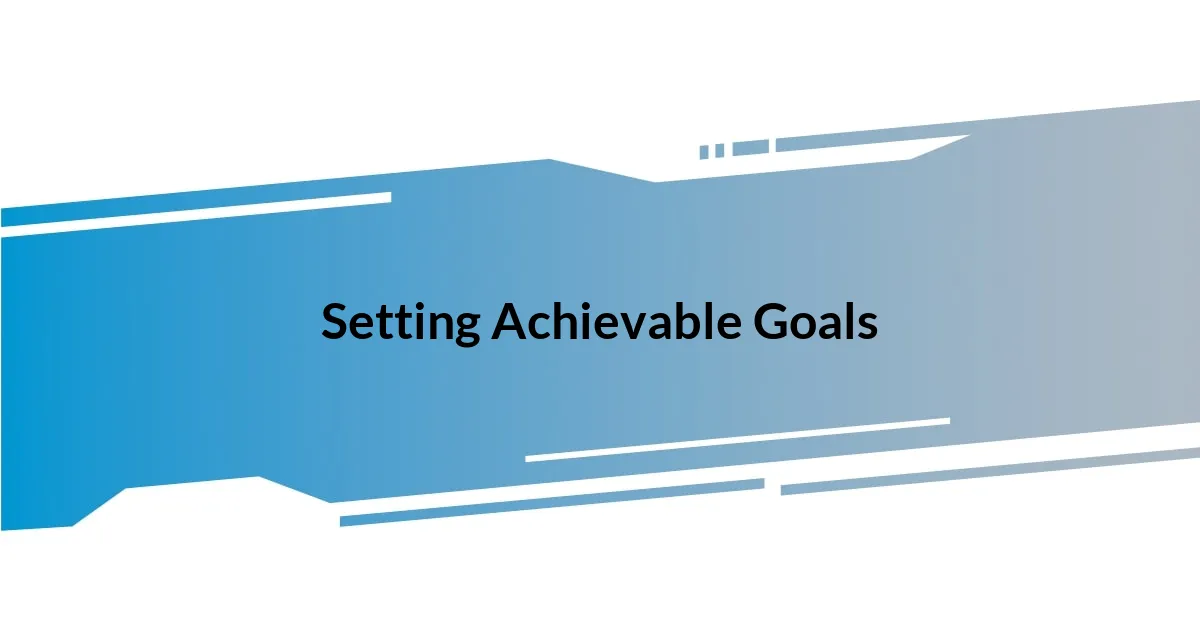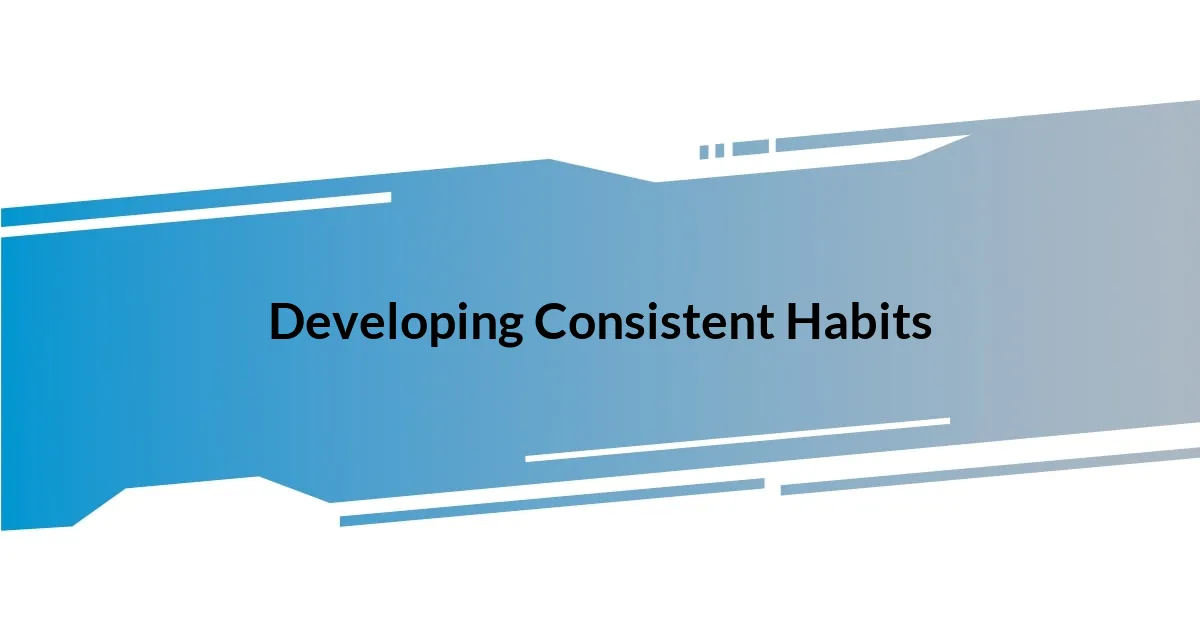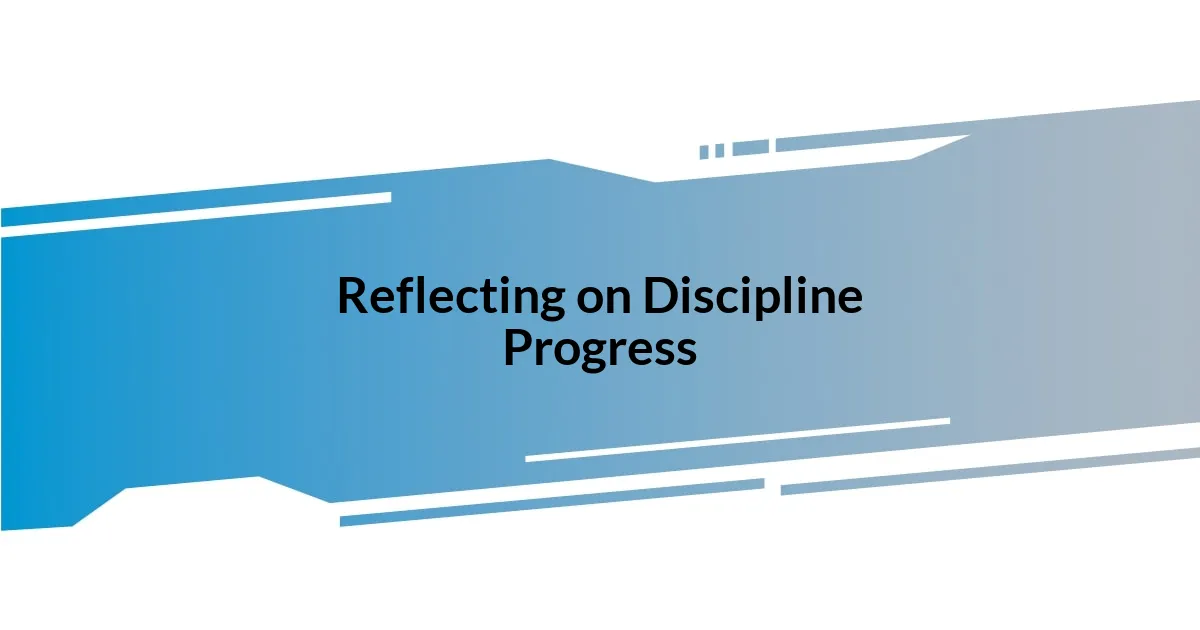Key takeaways:
- Personal discipline requires consistency, and overcoming resistance fosters confidence and a disciplined mindset.
- Breaking tasks into smaller chunks makes them more manageable and fosters motivation through small wins.
- Effective time management techniques, like the Pomodoro Technique and the Eisenhower Matrix, enhance focus and productivity.
- Reflecting on progress and embracing flexibility in goal-setting are crucial for sustaining personal discipline and growth.

Understanding Personal Discipline
Personal discipline is essentially about consistency and commitment to one’s goals. I remember the early days of my own journey when I set out to establish a routine. Those early mornings felt like battles, but as the weeks passed, I began to see the fruits of my labor. It’s like training a muscle; the more you exercise it, the stronger it becomes.
Reflecting on my experiences, I’ve often asked myself: What truly drives my discipline? For me, it wasn’t just about achieving goals; it was the satisfaction of overcoming resistance each day. Each time I pushed through a moment of procrastination or self-doubt, I felt a surge of confidence. Those instances became milestones in my journey, teaching me that discipline is not merely a skill; it’s a mindset I actively cultivate.
At times, I’ve felt overwhelmed by the sheer weight of self-discipline. During those moments, I found it helpful to break my tasks into smaller, more manageable chunks. This approach transformed the daunting into the doable. Has anyone else experienced a similar revelation? It’s fascinating to realize that in understanding our personal discipline, we unlock a deeper understanding of ourselves.

Strategies for Building Discipline
Building discipline is a journey, and I’ve found that establishing a structured routine is crucial in that process. In my own experience, I started by setting a specific time for my daily activities. Initially, it felt restrictive, but over time, that structure allowed me to anchor my day. I remember feeling empowered as I completed tasks, creating a ripple effect on my motivation.
Here are some strategies that have really helped me cultivate discipline:
- Create a Daily Schedule: Block time for specific tasks to bring clarity and consistency.
- Start Small: Instead of overwhelming yourself with big goals, tackle smaller tasks first. I found that checking off these smaller wins gradually built my momentum.
- Stay Accountable: I shared my goals with friends, which added a layer of commitment. The thought of updating them on my progress kept me on track.
- Use Rewards: Celebrate achievements! For every milestone, I treated myself to something enjoyable, reinforcing positive behavior.
- Reflect Regularly: I’ve adopted a habit of journaling my experiences. Reflecting on my progress helps me stay in touch with my motivations and adjust my strategies as needed.
Implementing these strategies has made a real impact on my discipline—turning it from an abstract goal into a tangible reality.

Time Management Techniques
Time management techniques have been a game changer for me. I vividly recall the chaos of juggling multiple tasks without a clear plan. It felt like I was constantly drowning beneath deadlines. Once I discovered techniques like the Pomodoro Technique, my productivity soared. This method, which involves working in focused bursts followed by short breaks, helped me maintain my concentration and prevent burnout. It’s almost therapeutic to pause and recharge, isn’t it?
Another technique that I hold dear is prioritizing tasks using the Eisenhower Matrix. Initially, I approached my tasks haphazardly, but this matrix helped me differentiate between what was urgent and what was important. I remember the relief I felt when I recognized that not everything on my to-do list required immediate attention. By categorizing tasks, I reclaimed precious time and focused on what truly matters, transforming my work efforts into meaningful progress.
I also have a strong belief in the power of time blocking. By dedicating specific hours of my day to particular activities, I created an environment where distractions were minimized. One morning, I set aside three hours solely for writing. During that uninterrupted time, I produced twice as much content compared to when I allowed myself to be sidetracked. This clear delineation of tasks resonated deeply with me, and I’ve made it a staple in my routine.
| Technique | Description |
|---|---|
| Pomodoro Technique | A time management method that uses timed intervals of work followed by short breaks to boost productivity. |
| Eisenhower Matrix | A tool for prioritizing tasks based on urgency and importance, helping to identify what truly matters. |
| Time Blocking | A method of dividing your day into chunks of time, with each block dedicated to a specific task. |

Setting Achievable Goals
Setting achievable goals has been a transformative experience for me. I remember when I set out to improve my fitness; instead of aiming for a lofty target of losing 20 pounds in a month, I focused on a more realistic goal of walking for 30 minutes three times a week. It felt manageable and, surprisingly, it opened up a sense of accomplishment that propelled me forward. Isn’t it amazing how small victories can build upon each other?
When I aim for small, specific goals, I find I’m more motivated to stick with them. For example, writing a page a day felt much less intimidating than saying I would finish a chapter every week. Each page completed was like a spark of motivation, lighting up my path toward bigger writing projects. I often ask myself, “What’s the next step I can take that feels achievable?” This question keeps me grounded, steering me toward progress rather than perfection.
I also learned the importance of flexibility in setting these goals. Life can be unpredictable, and I’ve faced days when my plans went awry. On one occasion, I aimed to meditate for 20 minutes daily, but I found that some days, just five minutes was all I could manage. And you know what? That was perfectly ok! By allowing myself to adapt, I stayed committed without feeling burdened—a revelation that made my practice more sustainable in the long run. How liberating is it to realize that achieving a goal doesn’t always look the same every day?

Developing Consistent Habits
Developing consistent habits is all about finding what resonates with you personally. I recall starting my day with a morning routine that felt almost magical. By simply dedicating 10 minutes to stretching and deep breathing, I felt more centered and ready to tackle whatever came my way. Have you ever experienced that rush of energy just from taking a moment for yourself? It’s invigorating!
I’ve also learned that consistency thrives on small changes rather than big leaps. One winter, I committed to writing just 100 words each morning. Initially, I thought it was too simple to matter, but those minutes turned into paragraphs, and before I knew it, I was producing pages of work. That tiny habit became a foundation for my writing practice. Isn’t it strange how small beginnings can snowball into something significant?
Another enlightening realization for me was the role of accountability. When I shared my goals with friends, I felt a sense of commitment that kept me on track. I remember when I decided to read more; I joined a book club. Discussing each book with others built anticipation and motivation. How powerful it is to share our journeys with others, right? It adds an extra layer of encouragement that can propel us forward!

Overcoming Obstacles in Discipline
Overcoming obstacles in discipline is a journey that’s often filled with surprises. I remember grappling with procrastination while trying to implement a new study schedule. Some nights, I’d sit at my desk, staring at my notes, feeling overwhelmed. It was frustrating! But then I realized, breaking my study time into 25-minute chunks—what some call the Pomodoro Technique—transformed my experience. Each session felt like a mini victory, and I found myself savoring the progress I made rather than dreading the task.
There are moments when I’ve felt like giving up, especially when I tried to establish a fitness routine. After a few weeks of ups and downs, I came to understand the importance of accepting setbacks. One rainy day, I skipped my workout and indulged in pizza instead. To my surprise, rather than wallowing in guilt, I decided to refocus and plan a fun indoor workout to bounce back. Have you ever felt that moment of clarity after a slip-up? It’s in those moments that I recognized setbacks are just part of the process—not the end of it.
Another significant hurdle was dealing with self-doubt. When I first started writing seriously, I often questioned my abilities. The fear of failure weighed heavily on my shoulders. One evening, I decided to share my work with a close friend. The feedback was overwhelmingly positive, which opened my eyes to the power of community support. Have you ever experienced a gentle nudge from a friend that changed your perspective? It’s incredible how sharing our fears can lead to strength and reassurance. Recognizing that I’m not alone in my struggles has been a game-changer for my discipline.

Reflecting on Discipline Progress
Reflecting on my discipline progress has often felt like flipping through a scrapbook of my journey. There were days when the changes I was making seemed invisible, but looking back, it’s striking to see how far I’ve come. I can recall times when even the smallest victories, like choosing water over soda, made me feel proud of my choices. Isn’t it wild how progress can sometimes be hidden in the mundane?
One particular instance stands out for me: after months of practice, I finally reaped the benefits of my consistent morning routine. During a particularly busy week, I found myself rushing out the door without my stretching session. It was then that I recognized how critical that small time investment had become. I felt more anxious that day, and my energy plummeted. Have you ever missed a routine that you once thought was insignificant, only to discover how much you relied on it? That moment solidified my understanding that each step—no matter how small—was integral to my overall discipline.
As I reflect, I also notice the shifts in my mindset. I used to view discipline as a series of rigid rules, but I now see it as a dynamic pathway. Each challenge I faced taught me something different about myself, whether it was the value of flexibility in my practices or the courage to embrace imperfections. Can discipline evolve with us, I wonder? I’ve learned to celebrate my uniqueness in this process, realizing that my path doesn’t need to look like anyone else’s. This realization brings a sense of freedom that fuels my commitment to continuous growth.